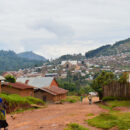New America, Young Africa and Old Europe
 In November 2006, Jendayi Frazer, then Assistant Secretary of State for African Affairs, prided herself of “no longer traveling to Africa via Europe”, adding: “We don’t need that any more. We deal with the continent directly, our own way”. She made the statement in San Francisco when addressing the annual meeting of the African Studies Association (ASA), appositely convened under the theme (Re)Thinking Africa and the World: Internal Reflections, External Responses. A month later, if not at Washington’s instigation at least with American backing, Ethiopian troops officially invaded Somalia – boots had been on the ground since July – to oust the Islamic Court Union in Mogadishu. This was the beginning of, arguably, the Bush administration’s biggest African blunder (together with the palempsestuous policy vis-í -vis Khartoum and the resulting inaction in Darfur). Would a stopover in Rome have been such a bad idea before starting a proxy war to flush out presumed al-Qaeda affiliates in Somalia?
In November 2006, Jendayi Frazer, then Assistant Secretary of State for African Affairs, prided herself of “no longer traveling to Africa via Europe”, adding: “We don’t need that any more. We deal with the continent directly, our own way”. She made the statement in San Francisco when addressing the annual meeting of the African Studies Association (ASA), appositely convened under the theme (Re)Thinking Africa and the World: Internal Reflections, External Responses. A month later, if not at Washington’s instigation at least with American backing, Ethiopian troops officially invaded Somalia – boots had been on the ground since July – to oust the Islamic Court Union in Mogadishu. This was the beginning of, arguably, the Bush administration’s biggest African blunder (together with the palempsestuous policy vis-í -vis Khartoum and the resulting inaction in Darfur). Would a stopover in Rome have been such a bad idea before starting a proxy war to flush out presumed al-Qaeda affiliates in Somalia?
If it were to see 21st-century Africa through postcolonial lenses, and to rehabilitate the “colonial library” as a surrogate for on-the-spot assessment and direct engagement with Africans, Europe’s capitals might very well be over flown. One may even concede that Donald Rumsfeld’s “old Europe” barb struck a chord in the vicinity of truth. But then, why should the renewal of U.S. policy in Africa under President Obama pass through Europe? For essentially three reasons, each proper to a continent but all three complementary: America’s geopolitical “overstretch”, Europe’s postcolonial “fatigue” and Africa’s “need for allies in democracy”. The argument is laid out here, more specifically, for France, the European country most heavily invested – politically, militarily, economically and culturally – in Africa and, until the end of the Cold War, the continent’s “gendarme” (at least “in the desert sands where the Gaulish cockerel may well whet his spurs”, as stated by Bismarck).
The Cold War is a useful reminder but the parallel misleading. Subcontracting francophone Africa again to Paris, in order to restore under post-9/11 conditions the geopolitical division of labor that obtained prior to the fall of the Berlin wall, would definitely not renew U.S. policy in Africa. Nor would it be at all possible to cram French-speaking Africa back into the neocolonial box. Moreover, France doesn’t put her money any longer where her mouth is: indeed, French direct investment in non-francophone Africa (notably Nigeria, South Africa, Angola, and Kenya) by far exceeds the stakes still held in sub-Saharan countries where Molií¨re is read in the original. Therefore, synergy – from the Greek synergos, “working together” – and not condominium is the order of the day.
Take the example of military cooperation and Africa’s security architecture. Great Britain, France and the US (the latter with special emphasis on “global war on terrorism”) each run their own separate assistance program destined to foster Africa’s capacity to unite its collective security efforts – not precisely leadership through good example! And there is no end in sight: the African Standby Force, conceived to rest on five brigades (with 5,000 troops each) as its regional pillars, will not be operational, as planned, by 2010 – and most likely not anywhere near that date. Yet, in the meantime, the French are pulling out, ending a military presence which had been maintained since, and despite, the independence of its former colonies in 1960. Good riddance to postcolonial rubbish? It would be easier to jubilate, if the withdrawal of French “pre-positioned” troops (they are still 6.500, down from twice as many) did not jeopardize already existing peace-keeping operations in Ivory Coast, Liberia, Sierra Leone or Darfur, and prompt new deployments of UN blue helmets in Chad and the Central African Republic.
By no stretch of “Obamania”, Africa will want the United States to fill the gap – nor, of course, is Washington at all tempted to step in. With wars on its hands in Iraq and Afghanistan, the new administration will already pain to redefine the mission of its Africa Command (AFRICOM), set up autonomously by Donald Rumsfeld to “punish” a not entirely subservient Central Command (CENTCOM). Since, AFRICOM has turned into a Super-NGO of the Pentagon, with ill-defined military as well as civilian attributes. Its headquarters are unwelcome in Africa, where suspicion looms large. The farewell to unilateral thaumaturgy and the acknowledgment of “overstretch” call for burden-sharing on the continent of lesser but growing strategic importance. For obvious geographical and political reasons, Europe is America’s natural ally south of the Mediterranean: by joining forces, the Old Continent and the New World may prevent “young Africa” – half of its still rapidly growing population of 900 million is less than 20 years old – to fall into the hands of a “new breed of dictators” much worse than their infamous predecessors during the Cold War.
Twenty years ago, Africa was considered an unlikely place for democracy. But after the fall of the Berlin Wall, democracy “broke out” across the continent despite structural impediments, such as educational standards and a modicum of wealth for a middle class to emerge. Political freedom and civil liberties are a good in and for themselves, and they are “out there” in a globalizing world – not only desirable but available. However, is the victory of the “causers” over the “causes” for democracy sustainable in Africa? Precisely because the continent is no longer Europe’s backyard, African rulers, namely in subsoil-rich countries, have options to choose. Not all roads lead to democracy. This is not about a new “mission to civilize”: India might as well foster democratic rule in Africa as, so far, China has not. Yet, to constitute a critical mass for constructive engagement, President Obama would be well advised to join forces with Europe.
Because Africa is so young, the journey will inevitably be long. Enthusiasm helps but may run out of breath. Europe can be a precious victualing station for the genius of realism: experience.





